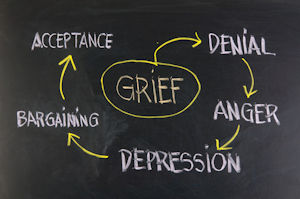
No one can prepare you for the inexplicable heartbreak that accompanies grief.
Mourning and grief are natural responses to a number of factors, including:
1. Loss of a relationship
2. Death of a loved one - human or animal
3. Diagnosis of a terminal illness
Though all things improve with time, for many, grief can cause an individual to enter a very deep depression.
Generally speaking, a person in mourning will go through five different stages of grief. These don't necessarily occur in the order listed, and can vary in severity:
- Denial
- Anger
- Negotiation
- Depression
- Acceptance
If you find yourself falling deeper into this dark hole, counseling is one of the most helpful things you can seek out to help you through this difficult time. Though nothing will make the pain go away, a therapist can help you cope with the way your life will change as a result of the triggering news, and how to enjoy your life again.
During your mourning, you might find it really difficult to leave the house and actually attend face-to-face counseling. Online therapy offers support and guidance during your time of need, and all from the convenience and comfort of your home.
Denial
Your initial response to the loss of a loved one or knowledge of terminal illness is usually a denial of the situation. You're going to try to rationalize what's going on and try to control the emotions you're feeling.
"This isn't real; this can't be happening." Telling yourself things like this and blocking your mind from the reality of the situation is simply your body's way of protecting itself from the sudden shock of the news. This denial helps you through the first, initial wave of pain.
Anger
Once you start to realize whatever is happening is, in fact, happening, your next response might be to react with anger. The pain your denial had suppressed is resurfacing and you explode with emotion.
It's normal to find yourself getting angry at anyone or anything - inanimate objects, clerks, family members - you know your target isn't to blame, but you need to release the overwhelming amount of emotions you're feeling.
After getting angry with someone, you might start to feel guilty for ever having exploded at that person, only further angering you.
Depression
Since everybody mourns differently, there are different types of depression associated with grief.
The first type of depression is characterized predominantly by feelings of sadness and regret. You focus more on how much you miss that person, how much everything is going to cost, how you're depression is affecting others around you - and you find yourself in desperate need for reassurance and sympathy.
The second type is more private; a person who is grieving might not outwardly cry, but inside, they may be torn up. Instead of feeling sadness and regret, though, you might use this time to separate yourself from your loved ones; almost as an act of closure.
Bargaining or Negotiating
As you're grieving, you will feel more vulnerable and helpless than ever before. As such, it's natural to try to regain control of the situation by playing out different ways you could have responded:
- "If I would have listened to them and taken them to the doctor maybe they'd still be here..."
- "I should have been nice to them..."
- "If I would've just been more careful when I was younger, this wouldn't be happening..."
Acceptance
Unfortunately, not everyone who grieves reaches the final stage of acceptance. It's very normal for you to get stuck in any of the previously listed phases and spend the rest of your life angry or depressed over your loss.
This final stage is not a phase of happiness, but instead a time when the depression passes and you simply "are." You accept the reality of the situation, and you understand that you cannot control things. You finally reach a point of calmness in your life and are able to move on with things, adjusting to your new future.
Online Therapy
Though grief is a very private and personal experience, it's always beneficial to have someone to talk to and support you. Finding an online therapist for grief counseling can be a great way to have someone there for you when you're at your lowest, and comfort you when you need it most, especially if you've isolated yourself.
The Virtual Therapist Network has a wide range of professional grief counselors who are trained and experienced in grief and can provide you the online therapy you need in the comfort and privacy of your own home.